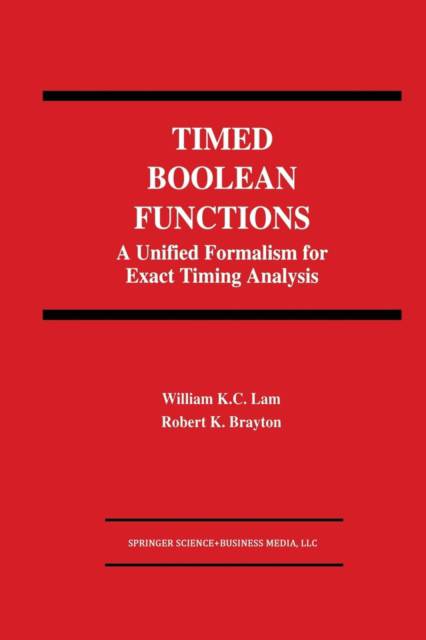
- Afhalen na 1 uur in een winkel met voorraad
- Gratis thuislevering in België vanaf € 30
- Ruim aanbod met 7 miljoen producten
- Afhalen na 1 uur in een winkel met voorraad
- Gratis thuislevering in België vanaf € 30
- Ruim aanbod met 7 miljoen producten
Zoeken
Timed Boolean Functions
A Unified Formalism for Exact Timing Analysis
William K C Lam, Robert K Brayton
€ 153,95
+ 307 punten
Uitvoering
Omschrijving
Timing research in high performance VLSI systems has advanced at a steady pace over the last few years, while tools, especially theoretical mechanisms, lag behind. Much present timing research relies heavily on timing diagrams, which, although intuitive, are inadequate for analysis of large designs with many parameters. Further, timing diagrams offer only approximations, not exact solutions, to many timing problems and provide little insight in the cases where temporal properties of a design interact intricately with the design's logical functionalities. This book presents a methodology for timing research which facilitates analy- sis and design of circuits and systems in a unified temporal and logical domain. In the first part, we introduce an algebraic representation formalism, Timed Boolean Functions (TBF's), which integrates both logical and timing informa- tion of digital circuits and systems into a single formalism. We also give a canonical form, TBF BDD's, for them, which can be used for efficient ma- nipulation. In the second part, we apply Timed Boolean Functions to three problems in timing research, for which exact solutions are obtained for the first time: 1. computing the exact delays of combinational circuits and the minimum cycle times of finite state machines, 2. analysis and synthesis of wavepipelining circuits, a high speed architecture for which precise timing relations between signals are essential for correct operations, 3. verification of circuit and system performance and coverage of delay faults by testing.
Specificaties
Betrokkenen
- Auteur(s):
- Uitgeverij:
Inhoud
- Aantal bladzijden:
- 273
- Taal:
- Engels
- Reeks:
- Reeksnummer:
- nr. 270
Eigenschappen
- Productcode (EAN):
- 9781461361565
- Verschijningsdatum:
- 6/10/2012
- Uitvoering:
- Paperback
- Formaat:
- Trade paperback (VS)
- Afmetingen:
- 156 mm x 234 mm
- Gewicht:
- 421 g

Alleen bij Standaard Boekhandel
+ 307 punten op je klantenkaart van Standaard Boekhandel
Beoordelingen
We publiceren alleen reviews die voldoen aan de voorwaarden voor reviews. Bekijk onze voorwaarden voor reviews.











